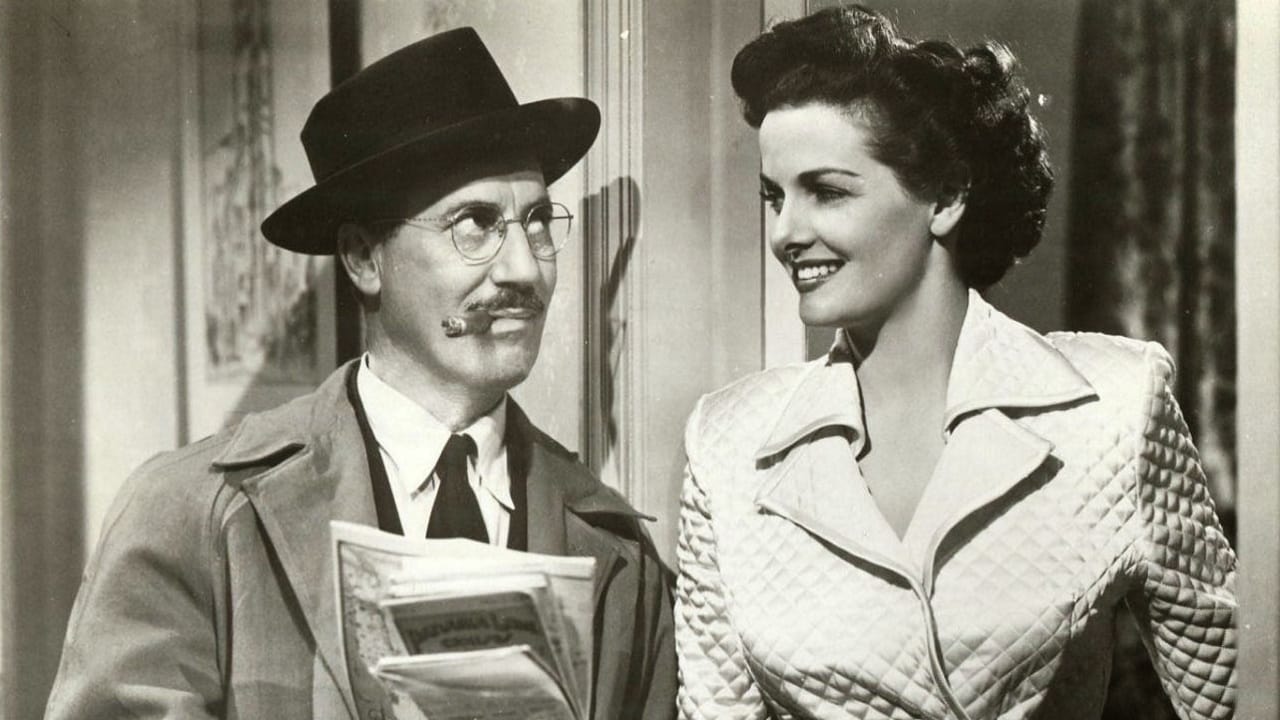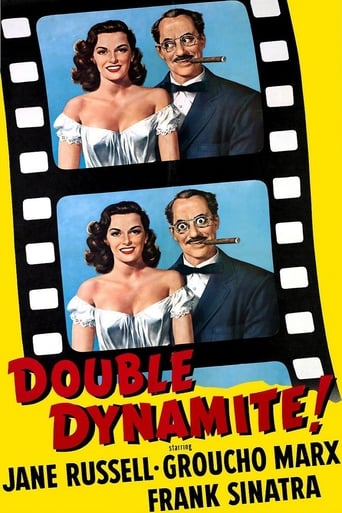

I watched this film with a close friend who is also very interested in the history and art of film, and even given the usually beneficial aspect of a shared viewing, this is a film which one forgets even as they are watching it. Basically nothing of interest happens, Jane Russell is wasted, Frank Sinatra is no help, and only Groucho manages to get off a meager handful of scenes worth noting, even though the writing is sub-par at best. Jane is a particularly interesting case: a woman whose best roles are sexy and tough as nails is here reduced to a rather prim and mundane character. And even the expectation of a few good songs is not met, even though both Frank and Jane (and even Groucho) are known to deliver in this area. A film only worth watching if you're a completionist of some sort. Very lackluster
... View MoreReleased by Howard Hughes three years after its filming, "Double Dynamite" is a pleasing comedy starring Jane Russell as Mibs Goodhue, Groucho Marx as Emile J. Keck, and Frank Sinatra as Johnny Dalton.The crux of the story is a coincidence--the disappearance of $60,000 from a bank and Dalton winning $60,000 at the track. He can't spend his winnings without alerting the suspicions of the authorities.The film features a couple of very enjoyable tunes by Jule Stine and Sammy Cahn that leave the viewer wanting more.Except for Russell's portrayal of her character being tipsy, she does a fine job. Groucho is his usual incorrigible self and Sinatra is charming. The three of them make the most of this small film.
... View MoreFrank Sinatra's last role under his contract with RKO was this slight comedy Double Dynamite. It was also the last time he played a milquetoast schnook. Double Dynamite was started in 1948 but Howard Hughes in his infinite wisdom kept under under wraps for three years, not releasing it until Christmas of 1951. In a backhanded way he may have helped Sinatra because in 1951 the film offers were not coming and at least his name was kept before the public eye.Hughes could read the trade papers though and the Sinatra who had box office clout in 1948 had little in 1951. Probably Frank was going to be billed below Jane Russell in a Hughes production in any event, but he was third billed below Groucho Marx in this one.If this had been done at Paramount you would have seen Eddie Bracken and Betty Hutton in the roles Sinatra and Russell have. They're both bank tellers at Howard Freeman's bank, but Freeman's in retirement and it's run by his playboy son Don McGuire and manager Harry Hayden.Frank and Jane make $42.50 a week, not a princely sum even back in 1951 and poor Frank goes and asks for a raise from Hayden. Personally I thought it was his best moment in the film. The way Hayden just jawbones him out of the raise reminded me of Branch Rickey negotiating salaries with baseball players. Right around the time this film was being made, there was a campaign against Rickey being orchestrated by New York Daily News sports columnist Jimmy Powers. One of the tags Powers hung on Rickey was El Cheapo. Based on the stories that Powers and others told about Rickey beating down every dollar a player might ask for, I have no doubt Rickey was the model for Hayden's character.Anyway Frank lucks into a windfall when he saves a notorious bookmaker, Nestor Paiva, from a beating being dished out by a rival mob. In gratitude Paiva 'lends' Frankie a thousand dollars and he bets on several 'sure things' with Paiva and he walks away with $60,000.00.But as Frank returns triumphantly from Paiva's betting parlor, he discovers Hayden making a speech to the staff about someone embezzling a lot of money. Not even Russell believes him. His only ally is their good friend, a waiter at a one arm spaghetti joint, Groucho Marx.At this point Groucho really takes over the film. He gives Sinatra and Russell all kinds of advice, romantic and financial, about how to deal with this perplexing situation. One of them being put all the money in his name. They do that and Groucho does live it up in grand style.Jule Styne and Sammy Cahn wrote two of their most forgettable songs. With the release held up for three years, Sinatra never even bothered to record them for Columbia Records where he was at the time. Kisses and Tears is a duet with Jane Russell and there's a comedy patter number, It's Only Money for Groucho and Frank. Sinatra was usually given some great songs by Styne and Cahn in the forties, but they definitely failed him here. If it wasn't for Groucho Marx, Double Dynamite might very well be several notches lower in my estimation. When he's not on the screen you just wait for him to come back. I have a funny feeling that Groucho stole the film from Jane Russell who Hughes was trying to build up and that that was the reason it was held up for three years.I marvel that Jane Russell had any career at all considering Howard Hughes's obsession with her two weapons of mass destruction. Double Dynamite is the third film that I know of that he held for years before releasing that starred her, The Outlaw and the noir classic His Kind of Woman were the other two. Good thing she did The Paleface with Bob Hope over at Paramount and out of his reach.Besides those mentioned look for a nice performance by William Edmunds as Groucho's suffering employer, Mr. Baganucci. And Don McGuire is really quite the wolf in wolf's clothing as he keeps sexually harassing Jane.It's not a great film, it might have been better had it been in the hands of someone like Preston Sturges at Paramount.
... View MoreThe post - Marx Brothers films of Groucho are somewhat astounding because of their mediocrity or worse. Groucho appeared in the late 1940s in four films: COPACABANA, DOUBLE DYNAMITE, A GIRL IN EVERY PORT, MR. MUSIC. He would subsequently appear alone in WILL SUCCESS SPOIL ROCK HUNTER, and finally made SKIDOO. None of these have the values of the best Marx Brother films, and yet they had pretty good casts in most of them: Carmen Miranda, Frank Sinatra and Jane Russell, William Bendix, Bing Crosby, Tony Randall and Jayne Mansfield, Jackie Gleason and Carol Channing. Some of the directors were interesting: Frank Tashlin in ROCK HUNTER and Otto Preminger in SKIDOO (even Richard Haydn in MR. MUSIC). But the films rarely have much going for them. Not that the two Marx Brother films of this period (LOVE HAPPY and THE STORY OF MANKIND) were anything to write home about.I tend to think that Groucho, wealthy and middle aged, was no longer really interested in proving anything in movies. His energies concentrated wonderfully on the radio and then television quiz show YOU BET YOUR LIFE. And he was right - his stardom remained high as a result. For that matter neither Harpo or Chico really needed to prove anything about their talents either. LOVE HAPPY was shot because (like A NIGHT IN CASABLANCA) Chico had some money troubles tied to his gambling. But Harpo and Groucho forced Chico to curtail some of his spending habits. From the point of making movies to impress none of them needed it.So I suspect Groucho was less than really choosy in picking his films. He definitely lucked out in DOUBLE DYNAMITE by having a film with Frank Sinatra and Jane Russell. Both had followings (Sinatra's first following peaking in 1948; Russell being notorious for THE OUTLAW). But the story is a rather weak one. Sinatra is a clerk in a business owned by Howard Freeman. He manages to save Nestor Paiva's life, and the grateful bookie puts money down for Sinatra on a sure-thing horse that wins big. Now Sinatra has money to burn, but just then there is an audit of the books, and Freeman discovers a huge discrepancy. So Sinatra becomes his chief suspect for embezzlement. Sinatra's problems are that he can't prove Paiva has repaid like this, and even if he could Freeman tends not to believe him. His only allies are his girlfriend and fellow worker Russell, and his closest friend Groucho (as Emil J. Ketch, a philosophical waiter with some biting wit). In the plot of the film, Groucho tries to help Sinatra by trying to get information from Freeman that may lead to the actual embezzler. This leads to the best portions of the film.I have commented on Howard Freeman elsewhere on this board. A gifted character actor, he is unjustly forgotten today. He was capable of dramatic performances (he was a memorable Himmler in HITLER'S MADMAN, and he was the crooked landlord of the fleabag hotel that Alan Ladd used in THE BLUE DAHLIA), and he was equally good in comedy (he is the wealthy sausage manufacturer who is convinced by an intruding Stewart Grainger not to marry the devious Eleanor Parker in SCARAMOUCHE). He was also one of the few character actors who ever had a chance to reverse a dramatic performance into a comic gem, when he took his self-centered, fatuous Himmler and used it as a nice guy mistaken for a Himmler in a CAR 54 WHERE ARE YOU? episode. With his abilities he was a first rate foil for Groucho.Freeman's Mr. Pulsifer is not fully prepared to prosecute Sinatra, but he certainly makes Sinatra aware of his peril. So Emil decides that he has to get to know Pulsifer and pry out of him various information about other potential suspects (such as Pulsifer's son). How to do this? Well Pulsifer has not met Emil as a waiter, so Emil dresses up as a wealthy potential business investor. Sinatra is footing the bill for Emil's luxury rooms at a hotel, and his wining and dining Freeman. Of course, the fatuous Freeman does fall for it. Here's the type of man he wants to associate with: a real man of the world. While Groucho spins the most outlandish lies, Freeman readily, greedily swallows them. The scenes between them are quite good.Groucho does recite "Gather ye rosebuds" at one point, and he has a nice duet with Sinatra. So there are positive points in the film. Ms Russell does the best she can but her lines are not memorable (the title's double entendre is the limit of wit regarding her role). It is a pleasant film, at times almost rising with Groucho and Freeman, but it is not up to the best work Groucho ever did.
... View More